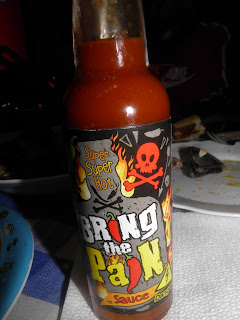Fish again. Tuna and another fish known here as 'the hunter' with white flesh and a not-too-fishy taste.
Sunday we had a family fish dish supper. Twelve of us around our big table. Eleven family members and the twelfth a neighbour. He was a late arrival on his way home from a male Sunday morning 'soiree' who promptly fell asleep at the table, waking up now and again to down another glass of wine . He slept for three hours, thankfully without falling off his chair.
Dandelion leaves, a kilo of them, an essential accompaniment to any fresh fish meal. Full of dirt and mud. Each root needs to be scraped clean and then all the leaves are given an extremely good clean, dunked three times in big tubs of water. Icy water at this time of the year. A job only for lovers of dandelion leaves
This is the tuna.
The white flesh fish, called 'the hunter' (kynigos). All the fish were cooked on the big bbq, by the men, who wined and dined, sorry 'tasted', while we made salads, fed the kids and set the table. As happens all over the western world
Sauce for the fish. Two parts fresh lemon juice, three parts olive oil, a good spoon of mustard, oregano and salt if you must.
Called 'salamoura'
Garlic bread rolls.
I make a bread mix, flour, yeast and water and let it rise for half an hour. I then form small buns and roll each bun in a bowl of olive oil with lots of crushed garlic and parsley*. The drippy, oily, garlicky bun is placed on baking paper in a baking tray. Leave for half an hour to plump up a little and bake for about twenty minutes till nice and brown.
*These ones had no parsley. Kids don't like green things in their bread. But I stuffed a square of gouda inside each roll
Leftovers! So much fish and this is after we ate a second fish meal the next day. Fortunately daughter Danae came and took it all away to make fish cakes. Kids love fish cakes, as long as their are no green things in them. These children don't mind thyme though. Their mother puts thyme in everything.
Thyme in the chicken, thyme in the bolognese, thyme in lentils, thyme in omeletes (omelettes), thyme in fish, meat, but mint in the peas.
Spinach pie pastry recipe she told me in the supermarket this morning
one cup of olive oil
one cup of wine
one egg
as much flour as it takes to make a nice soft dough. Mix together. Leave to rest twenty minutes. Roll out
Try it.
Really tasty and crispy, crunchy (so she said)







































































.jpg)















